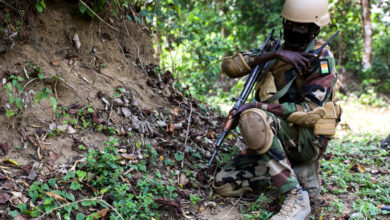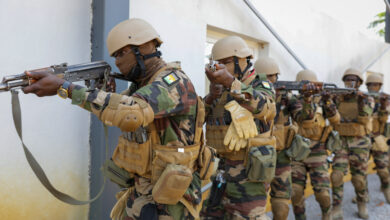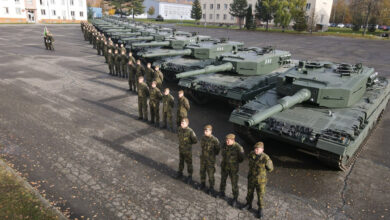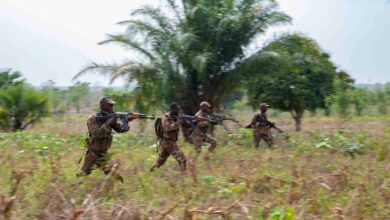The Czech Republic government approved a plan to send 60 troops to the France-led Operation Barkhane counter-terrorism mission in Africa’s Sahel region, the Ministry of Defense said in a release.
The proposal, which must be approved by parliament, will allow Czech armed forces to engage in Mali, Niger and Chad, the Monday, January 27 release said.
The release explained that the aim of Barkhane’s expansion is to build Task Force Takuba which will “assist and advise Malian partner forces and accompany them in combat operations.”
“The forward team should start operations in the middle of this year. The main part of the operation lasting 12 months is planned provisionally from August or September 2020,” said the Chief of the General Staff, Army General Aleš Opata.
Mali will be the main operational area of the Czech troops, although transport and cross-border operations in Niger are possible. Czech personnel will also be deployed to the Barkhane headquarters in Chad’s capital N’Djamena.
“The proposal will now be submitted to the Parliament of the Czech Republic. If it is approved, we will have a mandate to engage in Operation Barkhane with a maximum of 60 persons with effect until December 31, 2022,” Defense Minister Lubomír Metnar said.
The mininistry estimates the mission will cost at least 598 million Koruna ($26 million).
Around 120 Czech troops are already deployed to European Union Training Mission – Mali.
Task Force Takuba
France has for months been trying to build support for the new international special operations Task Force Takuba. Armed Forces Minister Florence Parly said in November that France expected the new force to deploy in Mali by 2020.
The Czech Republic is only the second country to publicly say it intends to to join the new task force, after Estonia said in November that it would deploy troops to Takuba. A defense ministry spokesperson then told The Defense Post that special forces will deploy to Mali in the second half of the year and that force will “assist, advise and accompany” the Malian Armed Forces.
On January 22, the Chief of the General Staff of the French Armed Forces General François Lecointre said that Takuba will declare initial military capability in the summer and “will be fully operational by the autumn.”
Lecointre said he was also presenting plans for French reinforcements to Operation Barkhane accompanied by “additional logistical and intelligence” support to President Emmanuel Macron. Announcements are expected on January 29, media reported.
The French military presence in the Sahel began in 2013 with Operation Serval in Mali, and evolved in August 2014 into Operation Barkhane, which has a mandate for counter-terrorism operations across the region. Roughly 4,700 French troops are deployed, and they focus activity in insurgent-hit Mali, Niger and Burkina Faso, working alongside local troops and other international operations, including the regional G5 Sahel Joint Force (FCG5S) and the United Nations stabilization mission in Mali, MINUSMA.
On January 13, Macron and the leaders of the G5 Sahel states announced a new Coalition for the Sahel which will see increased coordination between French and local forces focused on the Mali-Burkina Faso-Niger tri-border zone and targeting Islamic State as a priority. The new Sahel Coalition will see Barkhane and FCG5S forces operating under joint command.
Barkhane already has an international dimension, with European partners contributing troops and equipment. Denmark has deployed two Merlin helicopters and Estonia is to almost double the size of its Barkhane contingent this year. Chinook helicopters from the United Kingdom currently support the operation.
Islamist insurgents in the Sahel
The complex insurgency in the Sahel began in Mali in 2012, when a Tuareg separatist uprising was exploited by al-Qaeda-linked extremists who took key cities in the desert north. Former colonial power France began its Operation Serval military intervention the following year, driving the jihadists from the towns.
But the militant groups morphed into more nimble formations operating in rural areas, and the insurgency gradually spread to central and southern regions of Mali and across the borders into neighboring Burkina Faso and Niger.
Many armed groups including Islamic State are active in the Sahel region, but the majority of attacks are attributed to JNIM, which formed in March 2017 from a merger of several smaller groups. JNIM’s leadership has pledged allegiance to al-Qaeda leader Ayman al-Zawahiri.
Since May 2019, ISIS has attributed insurgent activities in the Sahel area to ISWAP, its West Africa Province affiliate that split from Boko Haram in 2016, rather than to Islamic State in the Greater Sahara. ISWAP’s main area of operations is the Lake Chad area of Nigeria, Niger, Chad and Cameroon.












